light Peugeot 308 2017 Owner's Manual - RHD (UK, Australia)
[x] Cancel search | Manufacturer: PEUGEOT, Model Year: 2017, Model line: 308, Model: Peugeot 308 2017Pages: 392, PDF Size: 10.13 MB
Page 4 of 392
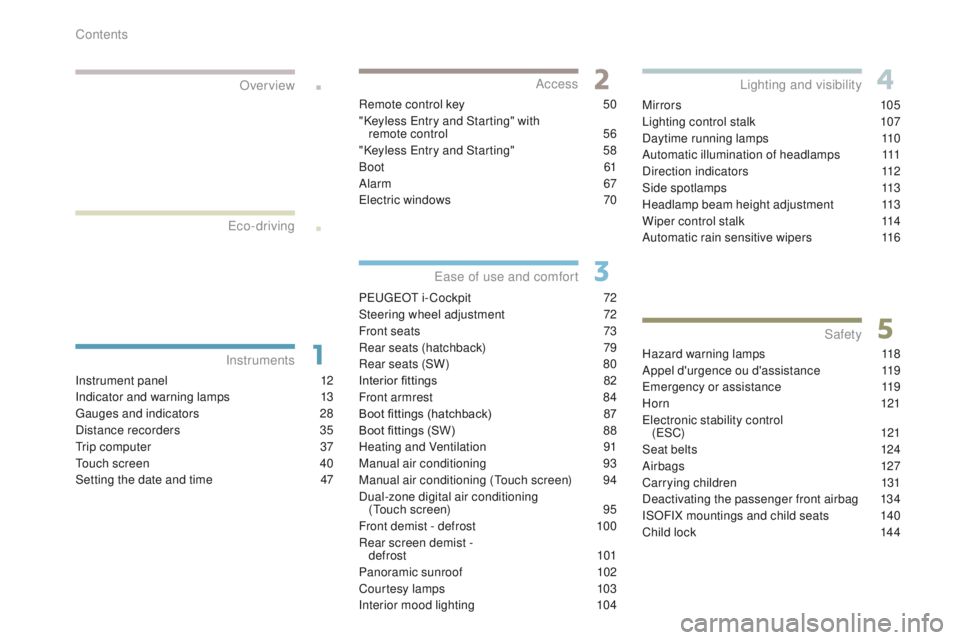
.
.
Over view
Instrument panel 12
Indicator and warning lamps
1
3
ga
uges and indicators
2
8
Distance recorders
3
5
tr
ip computer
3
7
to
uch screen
4
0
Setting the date and time
4
7Remote control key
5
0
"Keyless e
n
try and Starting" with
remote control
5
6
"Keyless e
n
try and Starting"
5
8
Boot
61
Alarm
6
7
el
ectric windows
7
0
P
e
uge
Ot
i- Cockpit
7
2
Steering wheel adjustment
7
2
Front seats
7
3
Rear seats (hatchback)
7
9
Rear seats (SW)
8
0
Interior fittings 8 2
Front armrest
8
4
Boot fittings (hatchback)
87
B
oot fittings (SW)
8
8
Heating and Ventilation
9
1
Manual air conditioning
9
3
Manual air conditioning (
to
uch screen)
9
4
Dual-zone digital air conditioning (
to
uch screen)
9
5
Front demist - defrost
1
00
Rear screen demist - defrost
101
Panoramic sunroof
1
02
Courtesy lamps
1
03
Interior mood lighting
1
04Mirrors
105
Lighting control stalk
1
07
Daytime running lamps
1
10
Automatic illumination of headlamps
1
11
Direction indicators
1
12
Side spotlamps
1
13
Headlamp beam height adjustment
1
13
Wiper control stalk
1
14
Automatic rain sensitive wipers
1
16
Hazard warning lamps
1
18
Appel d'urgence ou d'assistance 1 19em
ergency or assistance 1 19
H or n
121
ele
ctronic stability control
(
e
SC) 121
Seat belts
1
24
Airbags
127
Carrying children
1
31
Deactivating the passenger front airbag
1
34
ISOFIX mountings and child seats
1
40
Child lock
1
44
eco-driving
In struments Access
ea
se of use and comfort Lighting and visibility
Safety
Contents
Page 6 of 392
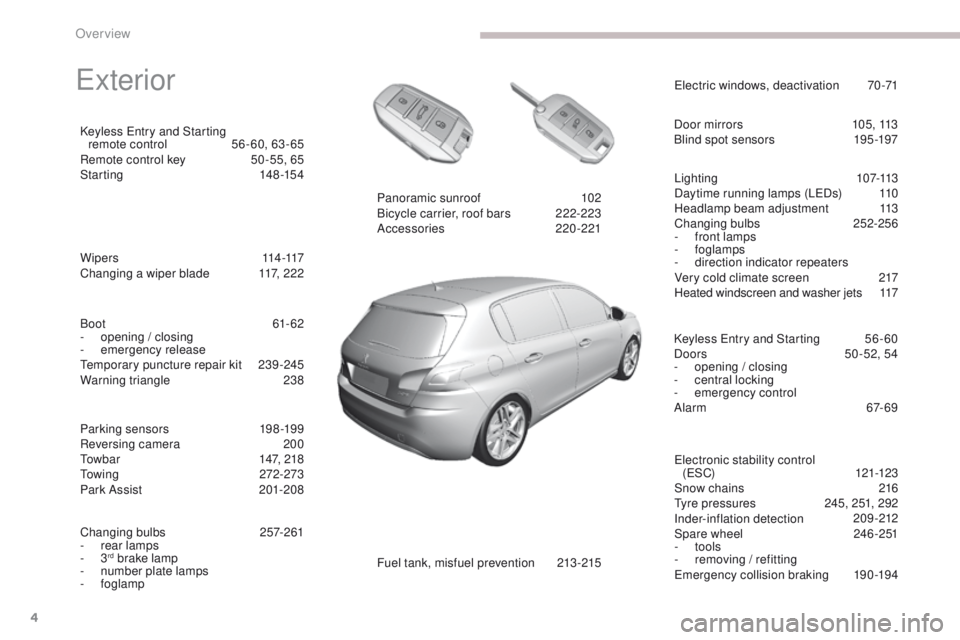
4
exterior
W i p e r s 114 -117
Changing a wiper blade 1 17, 222
Keyless
e
n
try and Starting
remote control
5
6 - 60, 63 - 65
Remote control key
5
0 -55, 65
Starting
1
48-154
ele
ctronic stability control
(
eS
C)
121-123
Snow chains
2
16
ty
re pressures
2
45, 251, 292
Inder-inflation detection
20
9-212
Spare wheel
2
46 -251
-
tools
-
r
emoving / refitting
em
ergency collision braking
1
90-194
Lighting
1
07-113
Daytime running lamps (L
eD
s)
1
10
Headlamp beam adjustment
1
13
Changing bulbs
2
52-256
-
f
ront lamps
- foglamps
- d irection indicator repeaters
Very cold climate screen
2
17
Heated windscreen and washer jets
1
17
el
ectric windows, deactivation
7
0-71
Keyless e
n
try and Starting
5
6 - 60
Doors
5
0 -52, 54
-
ope
ning / closing
-
c
entral locking
-
em
ergency control
Alarm
6
7-69
Fuel tank, misfuel prevention
2
13-215
Panoramic sunroof
1
02
Bicycle carrier, roof bars
2
22-223
Accessories
2
20-221
Boot
61-62
-
ope
ning / closing
-
em
ergency release
te
mporary puncture repair kit
2
39-245
Warning triangle
2
38
Parking sensors
1
98-199
Reversing camera
2
00
to
wbar
1
47, 218
to
wing
272-273
Park Assist
2
01-208
Changing bulbs
2
57-261
-
r
ear lamps
-
3
rd brake lamp
-
n
umber plate lamps
-
foglamp Door mirrors
1
05, 113
Blind spot sensors
1
95 -197
Over view
Page 9 of 392
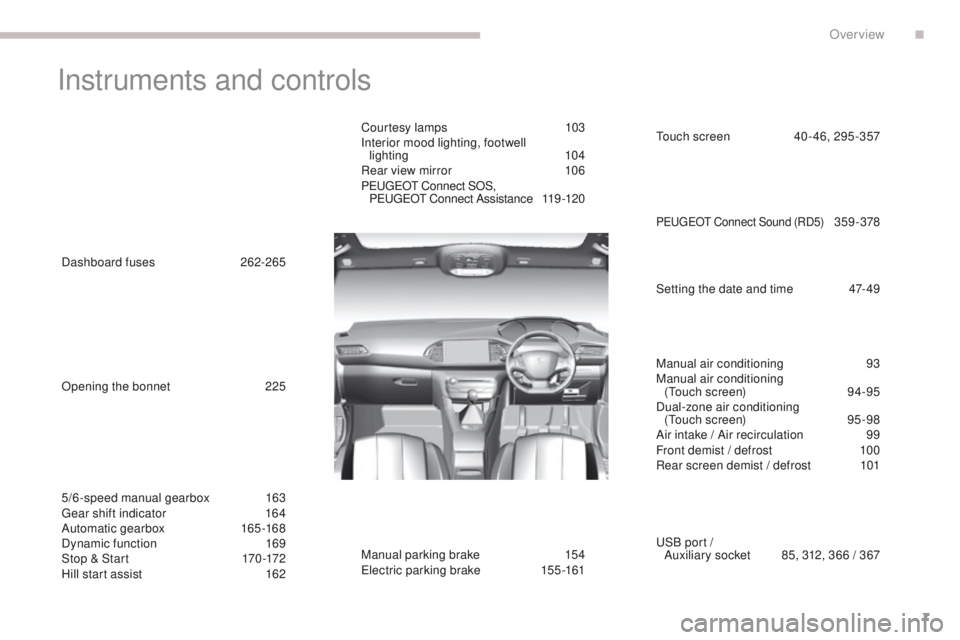
7
Instruments and controls
Courtesy lamps 103
Interior mood lighting, footwell lighting
1
04
Rear view mirror
1
06
Peuge
O
t Connect SOS,
Peuge
O
t Connect Assistance
1
19 -120
uS
B port /
Auxiliary socket
8
5, 312, 366 / 367
5/6-speed manual gearbox
1
63
ge
ar shift indicator
1
64
Automatic gearbox
16
5 -168
Dynamic function
1
69
Stop & Start
1
70 -172
Hill start assist
1
62
Dashboard fuses
2
62-265 Manual air conditioning
9
3
Manual air conditioning (
to
uch screen)
9
4-95
Dual-zone air conditioning (
to
uch screen)
9
5 -98
Air intake / Air recirculation
9
9
Front demist / defrost
1
00
Rear screen demist / defrost
1
01
Manual parking brake
1
54
el
ectric parking brake
1
55 -161to uch screen 4 0 - 46, 295 -357
Setting the date and time
4
7- 49
Opening the bonnet
2
25
PeugeO t Connect Sound (RD5) 359 -378
.
Over view
Page 10 of 392
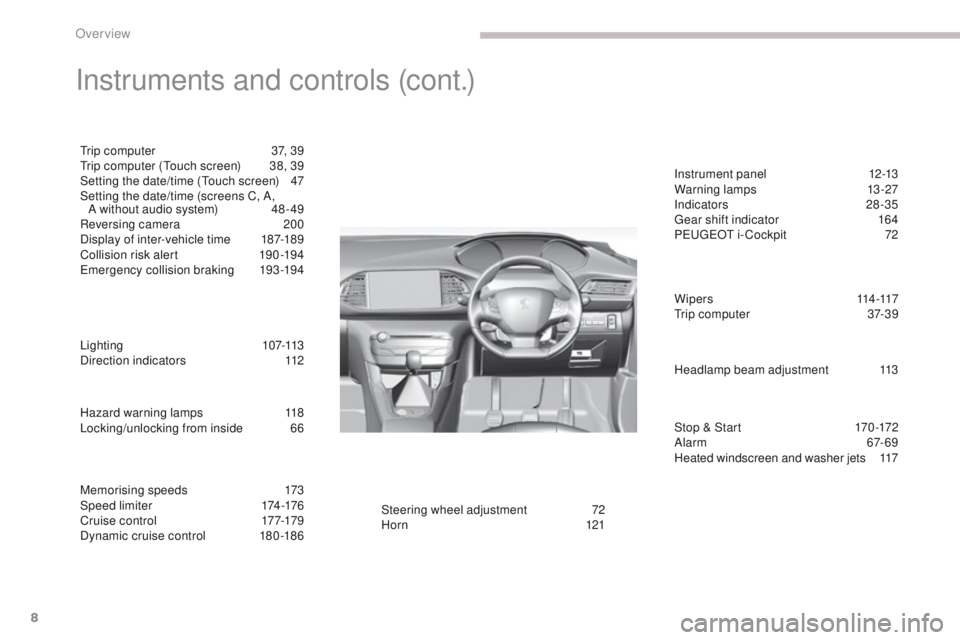
8
Hazard warning lamps 118
Locking/unlocking from inside 6 6
Lighting
1
07-113
Direction indicators
1
12 Instrument panel
1
2-13
Warning lamps
1
3-27
Indicators
28-35
ge
ar shift indicator
1
64
P
e
uge
Ot
i- Cockpit
7
2
Steering wheel adjustment
7
2
H or n
12
1
Memorising speeds
1
73
Speed limiter
1
74-176
C r u i s e c o nt r o l
17
7-179
Dynamic cruise control
1
80 -186 W i p e r s
11
4 -117
tr
ip computer
3
7-39
Instruments and controls (cont.)
trip computer
3 7, 39tr
ip computer (to uch screen) 3 8, 39
Setting the date/time (
to
uch screen)
4
7
Setting the date/time (screens C, A, A
without audio system)
4
8 - 49
Reversing camera
2
00
Display of inter-vehicle time
1
87-189
Collision risk alert
1
90 -194
em
ergency collision braking
1
93-194
Stop & Start
1
70 -172
Alarm
6
7-69
Heated windscreen and washer jets
1
17
Headlamp beam adjustment
1
13
Over view
Page 12 of 392
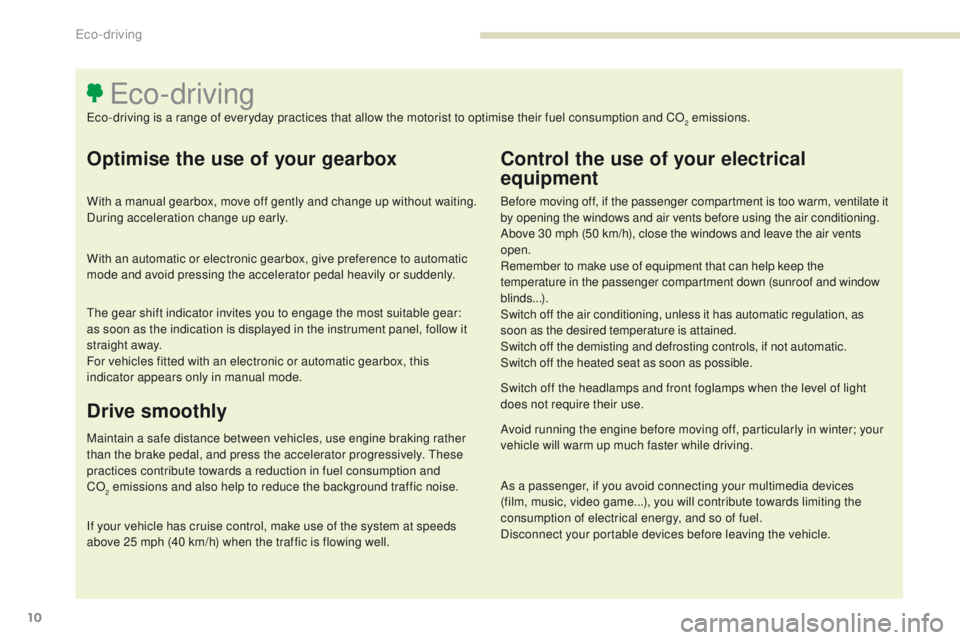
10
Optimise the use of your gearbox
With a manual gearbox, move off gently and change up without waiting.
During acceleration change up early.
With an automatic or electronic gearbox, give preference to automatic
mode and avoid pressing the accelerator pedal heavily or suddenly.
Control the use of your electrical
equipment
Before moving off, if the passenger compartment is too warm, ventilate it
by opening the windows and air vents before using the air conditioning.
Above 30 mph (50 km/h), close the windows and leave the air vents
open.
Remember to make use of equipment that can help keep the
temperature in the passenger compartment down (sunroof and window
blinds...).
Switch off the air conditioning, unless it has automatic regulation, as
soon as the desired temperature is attained.
Switch off the demisting and defrosting controls, if not automatic.
Switch off the heated seat as soon as possible.
Switch off the headlamps and front foglamps when the level of light
does not require their use.
Avoid running the engine before moving off, particularly in winter; your
vehicle will warm up much faster while driving.
As a passenger, if you avoid connecting your multimedia devices
(film, music, video game...), you will contribute towards limiting the
consumption of electrical energy, and so of fuel.
Disconnect your portable devices before leaving the vehicle.
eco-driving
eco-driving is a range of everyday practices that allow the motorist to optimise their fuel consumption and CO2 emissions.
Drive smoothly
Maintain a safe distance between vehicles, use engine braking rather
than the brake pedal, and press the accelerator progressively. th ese
practices contribute towards a reduction in fuel consumption and
CO
2 emissions and also help to reduce the background traffic noise.
I
f your vehicle has cruise control, make use of the system at speeds
above 25 mph (40 km/h) when the traffic is flowing well.
th
e gear shift indicator invites you to engage the most suitable gear:
as soon as the indication is displayed in the instrument panel, follow it
straight away.
For vehicles fitted with an electronic or automatic gearbox, this
indicator appears only in manual mode.
Eco-driving
Page 14 of 392
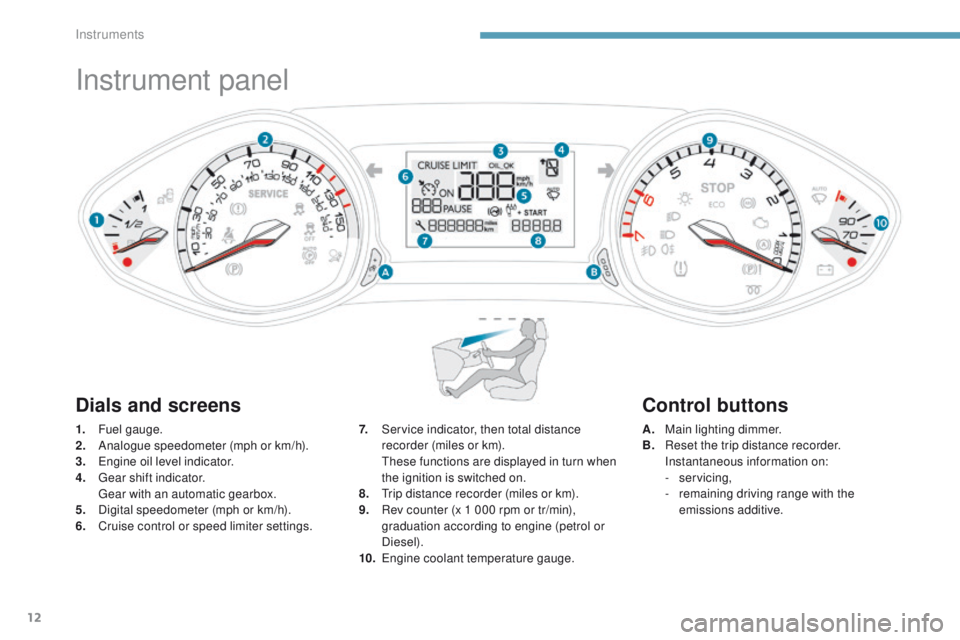
12
Instrument panel
1. Fuel gauge.
2. Analogue speedometer (mph or km/h).
3.
e
n
gine oil level indicator.
4.
g
e
ar shift indicator.
g
e
ar with an automatic gearbox.
5.
D
igital speedometer (mph or km/h).
6.
C
ruise control or speed limiter settings. A. M
ain lighting dimmer.
B. R eset the trip distance recorder.
I
nstantaneous information on:
-
servicing,
-
r
emaining driving range with the
emissions additive.
7. S
ervice indicator, then total distance
recorder (miles or km).
t
h
ese functions are displayed in turn when
the ignition is switched on.
8.
t
r
ip distance recorder (miles or km).
9.
R
ev counter (x 1 000 rpm or tr/min),
graduation according to engine (petrol or
Diesel).
10.
e
ng
ine coolant temperature gauge.
Dials and screens Control buttons
Instruments
Page 16 of 392
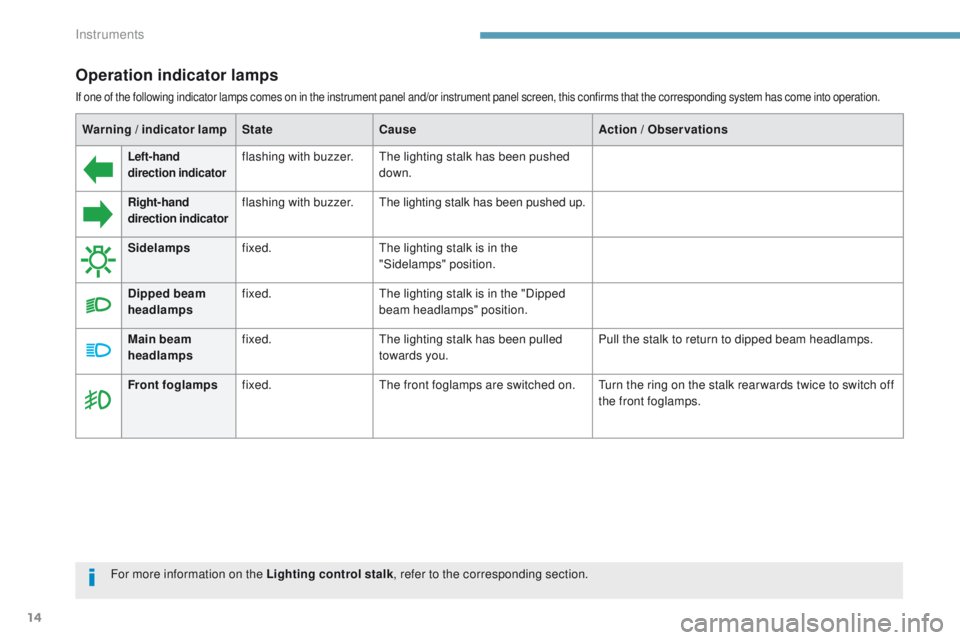
14
Operation indicator lamps
If one of the following indicator lamps comes on in the instrument panel and/or instrument panel screen, this confirms that the corresponding system has come into operation.
Warning / indicator lamp State Cause Action / Observations
Left-hand
direction indicatorflashing with buzzer.th e lighting stalk has been pushed
down.
Right-hand
direction indicatorflashing with buzzer.th e lighting stalk has been pushed up.
Sidelamps fixed.
th
e lighting stalk is in the
"Sidelamps" position.
Dipped beam
headlamps fixed.
th
e lighting stalk is in the "Dipped
beam headlamps" position.
Main beam
headlamps fixed.
th
e lighting stalk has been pulled
towards you. Pull the stalk to return to dipped beam headlamps.
Front foglamps fixed.
th
e front foglamps are switched on.
tu
rn the ring on the stalk rear wards twice to switch off
the front foglamps.
For more information on the Lighting control stalk , refer to the corresponding section.
Instruments
Page 18 of 392
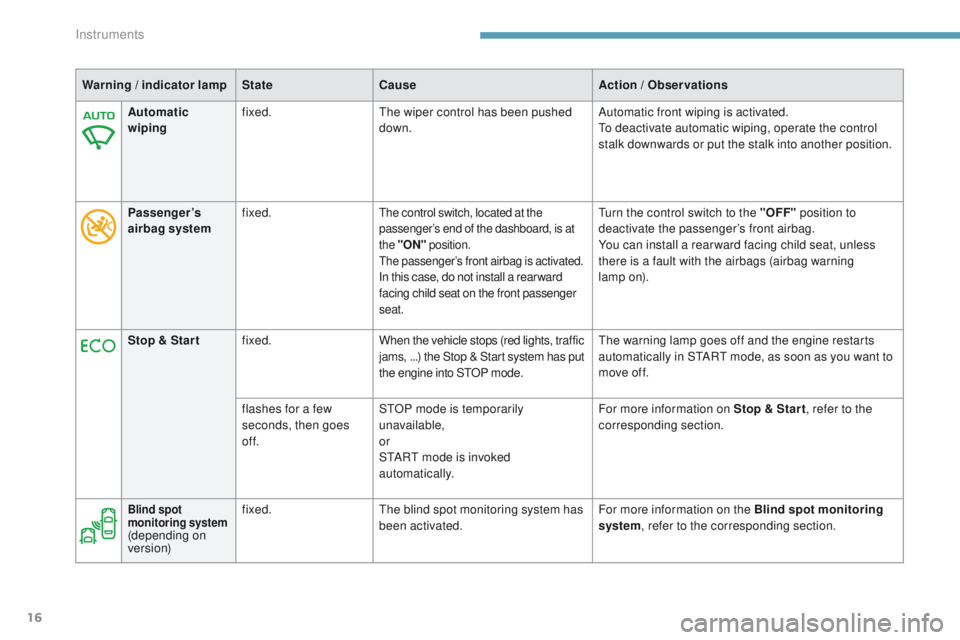
16
Warning / indicator lamp State Cause Action / Observations
Automatic
wiping fixed.
th
e wiper control has been pushed
down. Automatic front wiping is activated.
to d
eactivate automatic wiping, operate the control
stalk downwards or put the stalk into another position.
Passenger ’s
airbag system fixed.
the control switch, located at the
passenger’s end of the dashboard, is at
the
"ON " position.
the
passenger’s front airbag is activated.
In this case, do not install a rear ward
facing child seat on the front passenger
seat.
turn the control switch to the " OFF" position to
deactivate the passenger’s front airbag.
You can install a rear ward facing child seat, unless
there is a fault with the airbags (airbag warning
lamp
on).
Stop & Star t fixed. When the vehicle stops (red lights, traffic
jams,
...) the Stop & Start system has put
the engine into S
tO
P mode.
th
e warning lamp goes off and the engine restarts
automatically in S
tA
R
t
mode, as soon as you want to
move off.
flashes for a few
seconds, then goes
of f. S
tO
P mode is temporarily
unavailable,
or
S
tA
R
t
mode is invoked
automatically. For more information on Stop & Star t
, refer to the
corresponding section.
Blind spot
monitoring system
(depending on
ve r s i o n) fixed.
th
e blind spot monitoring system has
been activated. For more information on the Blind spot monitoring
system, refer to the corresponding section.
Instruments
Page 30 of 392
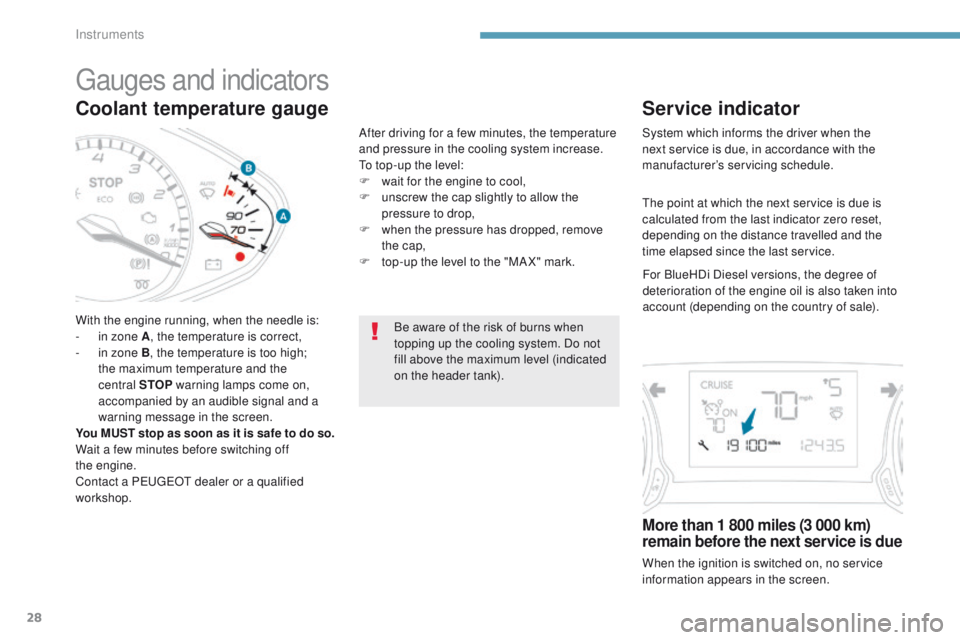
28
Coolant temperature gauge
With the engine running, when the needle is:
- i n zone A , the temperature is correct,
-
i
n zone B, the temperature is too high;
the maximum temperature and the
central STOP warning lamps come on,
accompanied by an audible signal and a
warning message in the screen.
You MUST stop as soon as it is safe to do so.
Wait a few minutes before switching off
the
engine.
Contact a P
e
uge
Ot
dealer or a qualified
workshop. After driving for a few minutes, the temperature
and pressure in the cooling system increase.
to t
op-up the level:
F
w
ait for the engine to cool,
F
u
nscrew the cap slightly to allow the
pressure to drop,
F
w
hen the pressure has dropped, remove
the cap,
F
t
op-up the level to the "MA X" mark.
Be aware of the risk of burns when
topping up the cooling system. Do not
fill above the maximum level (indicated
on the header tank).
gauges and indicators
Service indicator
System which informs the driver when the
next service is due, in accordance with the
manufacturer’s servicing schedule.
More than 1 800 miles (3 000 km)
remain before the next service is due
When the ignition is switched on, no service
information appears in the screen.
th
e point at which the next service is due is
calculated from the last indicator zero reset,
depending on the distance travelled and the
time elapsed since the last service.
For BlueHDi Diesel versions, the degree of
deterioration of the engine oil is also taken into
account (depending on the country of sale).
Instruments
Page 38 of 392
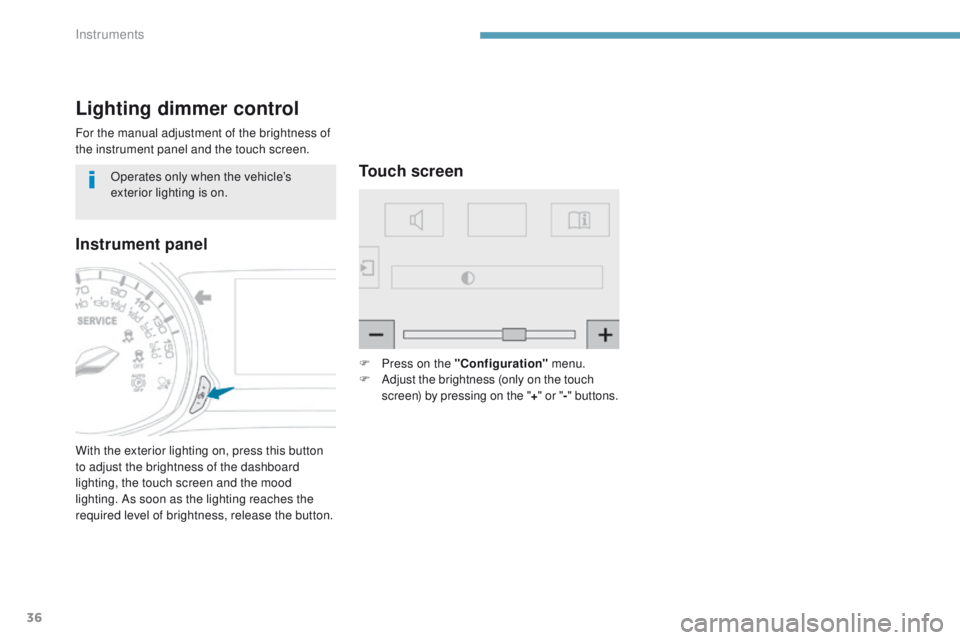
36
Lighting dimmer control
For the manual adjustment of the brightness of
the instrument panel and the touch screen.
With the exterior lighting on, press this button
to adjust the brightness of the dashboard
lighting, the touch screen and the mood
lighting. As soon as the lighting reaches the
required level of brightness, release the button.F
P
ress on the "Configuration" menu.
F
A
djust the brightness (only on the touch
screen) by pressing on the " +" or " -" buttons.
Operates only when the vehicle’s
exterior lighting is on.
Instrument panel
Touch screen
Instruments